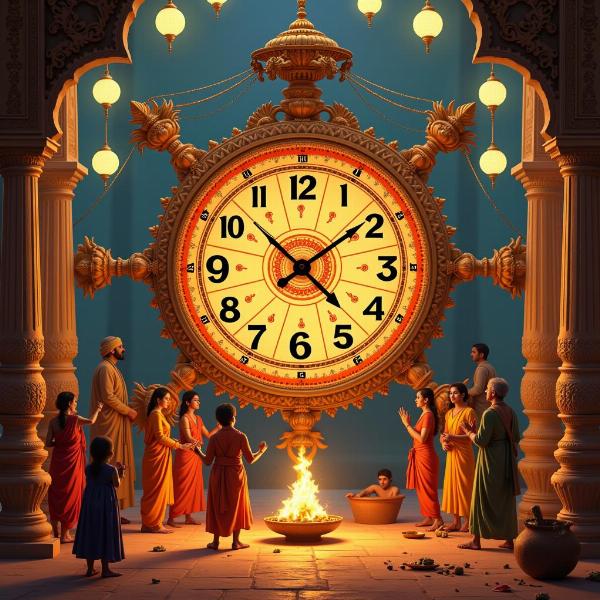Understanding the nuances of time expressions can be tricky when learning a new language. “It’s been a month” is a common phrase, but how do you express this sentiment accurately in Hindi? This guide explores various ways to convey the meaning of “it’s been a month” in Hindi, considering different contexts and cultural implications. We’ll delve into the grammatical structures, common usage, and provide practical examples to help you communicate effectively.
Expressing “It’s Been a Month” in Hindi
Several Hindi phrases can convey the meaning of “it’s been a month,” each with slightly different connotations. Here are some of the most common options:
- एक महीना हो गया है (Ek mahina ho gaya hai): This is perhaps the most straightforward and commonly used translation. It literally translates to “one month has happened/passed.” This phrase is suitable for most general contexts.
- एक महीना बीत गया है (Ek mahina beet gaya hai): This option emphasizes the passing of time, similar to “a month has passed.” It carries a slightly more formal tone.
- एक महीना पूरा हो गया है (Ek mahina pura ho gaya hai): This phrase highlights the completion of a month. It’s often used when referring to a specific timeframe, like the duration of a project or a deadline.
- महीना भर हो गया है (Mahina bhar ho gaya hai): This phrase literally translates to “a full month has passed,” emphasizing the entirety of the month.
Choosing the Right Phrase
The best phrase to use depends on the specific context. Are you talking about the time since an event? The duration of a project? The passage of time in general? Consider these nuances when choosing the most appropriate translation. For example, if you’re talking about the time since you last saw a friend, you might say, “एक महीना हो गया है (Ek mahina ho gaya hai).” If you’re discussing a project that took a month to complete, “एक महीना पूरा हो गया है (Ek mahina pura ho gaya hai)” might be more fitting.
Common Usage and Examples
Let’s explore some practical examples of how these phrases are used in everyday conversations:
- “It’s been a month since I started my new job.” – “मुझे नई नौकरी शुरू हुए एक महीना हो गया है (Mujhe nayi naukri shuru hue ek mahina ho gaya hai).”
- “It’s been a month since we last spoke.” – “हमारी आखिरी बातचीत को एक महीना हो गया है (Hamari aakhiri baatchit ko ek mahina ho gaya hai).”
- “It’s been a month since I visited my family.” – “मुझे अपने परिवार से मिलने गए एक महीना हो गया है (Mujhe apne parivar se milne gaye ek mahina ho gaya hai).”
Cultural Considerations
While the literal translations are accurate, cultural context plays a role in how time is perceived and expressed in Hindi. Indians often use more descriptive language and may incorporate cultural references when talking about time. For instance, they might refer to a specific festival or event that occurred a month ago.
Quote from Dr. Anamika Sharma, Hindi Language Expert: “Understanding the cultural context is crucial when translating time expressions. While the literal translations are important, they don’t always capture the full nuance of the meaning.”
 Cultural Context of Time in India
Cultural Context of Time in India
Conclusion
Accurately expressing “it’s been a month” in Hindi involves choosing the right phrase based on the context and understanding the subtle nuances of the language. This guide provides a starting point for mastering this common time expression. By considering the grammatical structures, usage examples, and cultural implications, you can communicate effectively and build stronger connections with Hindi speakers.
FAQ
- What is the most common way to say “it’s been a month” in Hindi? The most common way is “एक महीना हो गया है (Ek mahina ho gaya hai).”
- Is there a difference between “एक महीना हो गया है” and “एक महीना बीत गया है”? While both convey the meaning of “it’s been a month,” “एक महीना बीत गया है” emphasizes the passing of time slightly more.
- How do I choose the right phrase for my specific context? Consider the situation and what you want to emphasize – the passage of time, the completion of a month, or the time since a specific event.
- Are there any cultural considerations when talking about time in Hindi? Yes, Indians often use more descriptive language and may incorporate cultural references when discussing time.
- Where can I learn more about Hindi grammar and vocabulary? Meaning-Hindi.in offers a wealth of resources for learning Hindi.
Related Articles
Meaning-Hindi.in is your one-stop solution for all your Hindi translation needs. We offer a wide range of services, from business and legal document translation to website localization and technical manual translation. Our expert team ensures accuracy and cultural sensitivity in every project. Contact us today for a free quote! Email: [email protected], Phone: +91 11-4502-7584. Let Meaning-Hindi.in help you bridge the language gap.